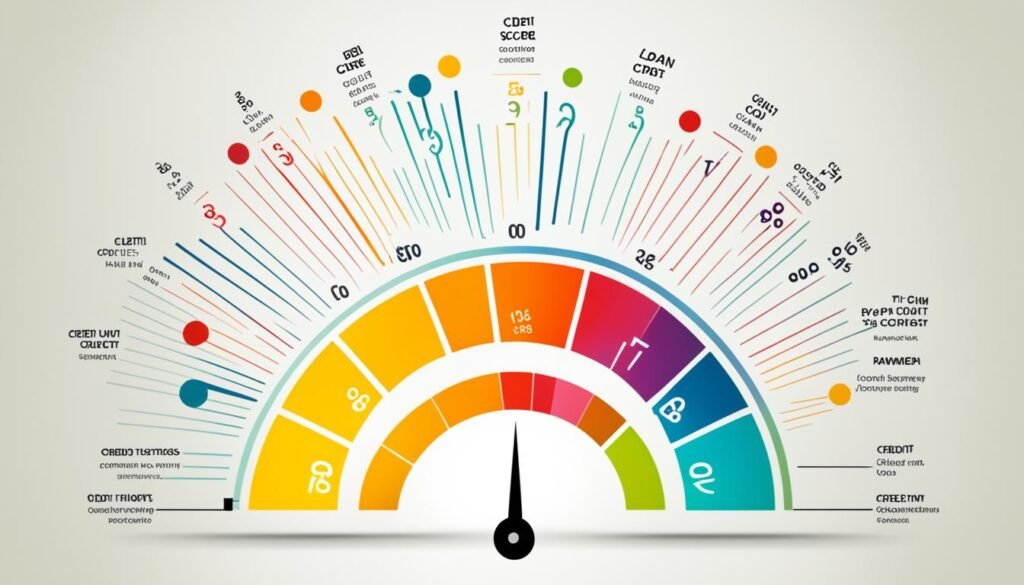Are you ready to secure your dream home? Before you embark on your homeownership journey, it’s crucial to understand loan terms and how they shape the mortgage process. In this comprehensive guide, we will demystify loan terms and provide you with the knowledge to confidently navigate the mortgage process.
Understanding loan terms is essential for borrowers who want to make informed decisions and secure favorable loan terms. Loan terms encompass the conditions and terms set by the lender, including the interest rates, loan amount, and repayment schedule. By having a deep understanding of loan terms, you can turn the complex world of borrowing into an opportunity to secure the home of your dreams.
Key Takeaways:
- Loan terms play a significant role in shaping the mortgage process and determining loan approval.
- Components of loan terms include interest rates, loan amount, repayment schedule, closing costs, and credit score.
- Creditworthiness and credit score significantly impact the loan terms offered by lenders.
- By navigating the loan application process effectively, you can negotiate favorable loan terms and minimize overall interest costs.
- Exploring different loan options and evaluating loan terms are vital for aligning with your financial goals.
The Importance of Loan Terms in the Mortgage Process
Understanding loan terms is crucial when it comes to the mortgage process. Loan terms encompass the conditions and terms set by the lender, including interest rates, loan amounts, and repayment schedules. These terms play a significant role in determining loan approval and the ultimate cost of borrowing.
Loan terms are the foundation of a mortgage loan. They outline the specific details of the loan agreement and are essential for both borrowers and lenders.
During the underwriting process, lenders carefully evaluate loan terms along with other factors such as credit history and income. This assessment helps determine the borrower’s eligibility for loan approval.
One of the key elements of loan terms is the interest rate. The interest rate represents the cost of borrowing and significantly impacts the overall loan amount and monthly payments.
Loan terms also stipulate the repayment schedule, which outlines the timeframe in which the loan must be repaid. Understanding the repayment schedule is vital for borrowers to plan their finances and ensure timely payments.
By comprehending loan terms, borrowers can make informed decisions and select the loan option that aligns with their financial goals. In turn, this enables borrowers to manage their monthly payments effectively and avoid any financial strain.
Next, we will delve into the key components of loan terms, exploring interest rates, loan amounts, and repayment schedules in more detail.
Key Components of Loan Terms
Loan terms encompass various key components that borrowers need to understand when entering into a loan agreement. By familiarizing yourself with these components, you can make informed decisions that align with your financial goals.
Interest Rates
Interest rates play a significant role in determining the overall cost of borrowing. They represent the percentage of the loan amount that lenders charge borrowers for the privilege of borrowing funds. It is crucial to carefully evaluate interest rates as they directly impact the amount of money you will repay over the life of the loan.
Loan Amount
The loan amount refers to the total sum borrowed from the lender. It is essential to consider the loan amount as it affects the overall affordability of the loan and your ability to meet the repayment obligations. Assessing your financial situation and determining the appropriate loan amount is crucial to ensure that you can comfortably manage your loan repayments.
Repayment Schedule
The repayment schedule outlines the timeline and structure of loan repayments. It indicates how often you need to make payments and the amount due at each installment. Understanding and adhering to the repayment schedule is vital to avoid defaulting on the loan and damaging your credit score.
Closing Costs
Closing costs encompass various fees and expenses involved in finalizing the loan. These costs typically include appraisals, inspections, title searches, and administrative fees. It is important to consider closing costs when negotiating loan terms, as they can significantly impact the total cost of the loan.
Credit Score
A credit score is a numerical representation of your creditworthiness and ability to repay debts. Lenders evaluate credit scores when determining loan terms and interest rates. Maintaining a good credit score can help you secure more favorable loan terms, including lower interest rates and more flexible repayment options.
By understanding the key components of loan terms, borrowers can effectively negotiate with lenders and secure loan terms that align with their financial circumstances and long-term goals.
Factors That Affect Loan Terms
When it comes to obtaining a loan, an essential aspect to consider is loan terms. These terms dictate the conditions and terms set by the lender, including the interest rates, loan amount, and repayment schedule. However, loan terms are not solely determined by the lender’s preferences. Various factors, such as the borrower’s creditworthiness and credit score, play a significant role in shaping the loan terms offered.
The loan application process involves the lender evaluating the borrower’s creditworthiness to assess their ability to repay the loan. One of the key factors considered is the borrower’s credit score. A credit score is a numerical representation of an individual’s creditworthiness, and it is derived from their credit history. A higher credit score indicates a lower risk for the lender, which may result in more favorable loan terms for the borrower.
Improving your credit score can positively impact the loan terms offered. By maintaining a good credit score, you increase your chances of receiving lower interest rates and a higher loan amount. This, in turn, can lead to more flexible repayment options and a more affordable loan overall.
It is important to note that loan terms are not solely determined by creditworthiness and credit scores. Other factors, such as the borrower’s income, employment history, and existing debt, are also considered by lenders during the loan application process. A borrower with a strong financial profile is more likely to secure favorable loan terms from lenders.
“Loan terms can vary significantly depending on the borrower’s creditworthiness and credit score. A higher credit score can result in lower interest rates and more attractive loan offers.”
In addition to the borrower’s factors, lenders also consider their own criteria when determining loan terms. Each lender has specific guidelines and requirements that borrowers must meet to qualify for certain loan terms. Thus, it is crucial to research and compare different lenders to find the one that aligns with your financial goals.
Improving Creditworthiness and Securing Favorable Loan Terms
If you are looking to improve your creditworthiness and secure favorable loan terms, here are some steps you can take:
- Pay your bills on time and in full
- Keep your credit card balances low
- Avoid opening multiple credit accounts in a short period
- Regularly review your credit report for errors or discrepancies
- Reduce your overall debt and manage it responsibly
By focusing on these strategies, you can enhance your creditworthiness over time, making you a more attractive borrower in the eyes of lenders and increasing your chances of securing favorable loan terms.
Key Factors That Affect Loan Terms
| Factors | Impact on Loan Terms |
|---|---|
| Creditworthiness | Determines the level of risk for lenders and influences the interest rates and loan terms offered |
| Credit Score | A higher credit score may result in lower interest rates and more favorable loan terms |
| Income | Higher income may lead to larger loan amounts and more flexible repayment options |
| Employment History | Stable employment history can instill confidence in lenders, potentially leading to preferential loan terms |
| Existing Debt | High levels of existing debt may limit loan amounts and result in less favorable loan terms |
Understanding the factors that affect loan terms empowers borrowers to make informed decisions during the loan application process. By focusing on improving creditworthiness and considering lenders’ requirements, borrowers increase their chances of securing favorable loan terms that align with their financial needs and goals.

Navigating the Loan Application Process
Understanding the loan application process is vital for borrowers who want to secure the best loan terms. By familiarizing yourself with each step, you can navigate the mortgage process more effectively, ensuring a smooth and successful loan application. Here is a step-by-step guide to help you through the process:
Gather the necessary documents
Prior to starting your loan application, gather all the required documents. This includes recent pay stubs, W-2 forms, tax returns, bank statements, and any additional financial documentation the lender may request. Having these documents readily available will streamline the application process and demonstrate your financial stability to the lender.
Submit your loan application
Once you’ve gathered all the necessary documents, it’s time to submit your loan application. You can typically do this online or in-person at the lender’s office. Ensure all information is filled out accurately and completely to avoid delays in the process. The loan application provides crucial information that helps lenders evaluate your creditworthiness and determine appropriate loan terms.
Understand the underwriting process
After submitting your loan application, it goes through the underwriting process. During underwriting, the lender examines your financial information and assesses your ability to repay the loan. The underwriter analyzes factors such as credit history, income stability, employment history, and debt-to-income ratio. Understanding the underwriting process allows you to anticipate potential challenges and address them proactively to secure favorable loan terms.
“Navigating the loan application process effectively can minimize overall interest costs and help you negotiate favorable closing costs.”
Minimize overall interest costs
One of the key advantages of navigating the loan application process effectively is the ability to minimize overall interest costs. By securing competitive loan terms, such as lower interest rates and shorter loan terms, you can significantly reduce the total amount of interest you’ll pay over the life of your loan. Lower interest costs mean more money saved in the long run, giving you greater financial flexibility.
Negotiate favorable closing costs
Closing costs are additional expenses associated with finalizing your mortgage and complete the home buying process. These costs can include appraisal fees, title insurance, attorney fees, and more. Navigating the loan application process effectively allows you to negotiate favorable closing costs, potentially saving you thousands of dollars. By comparing offers from different lenders and understanding the breakdown of closing costs, you can make informed decisions to minimize these expenses.

By understanding the loan application process and its impact on loan terms, you can optimize your chances of securing favorable conditions. Remember to gather the necessary documents, submit your application accurately, grasp the underwriting process, and aim to minimize both overall interest costs and closing costs. Taking these steps will help you navigate the process successfully and secure the best loan terms for your financial goals.
| Steps to Navigate the Loan Application Process | Benefits |
|---|---|
| Gather the necessary documents | Streamlines the application process |
| Submit your loan application | Begins the evaluation process and determines loan terms |
| Understand the underwriting process | Allows you to address potential challenges and secure favorable loan terms |
| Minimize overall interest costs | Saves money over the life of the loan |
| Negotiate favorable closing costs | Potentially saves thousands of dollars |
Exploring Different Loan Options
Borrowers have access to a wide range of loan options with varying loan terms. Understanding the loan terms associated with each option is crucial when making financial decisions that align with your goals. In this section, we will delve into the loan options provided by traditional lenders and alternative lenders and explain the loan terms they offer.
Traditional lenders, such as banks and credit unions, are well-established financial institutions that offer a wide range of loans. These lenders typically provide fixed-rate mortgages, where the interest rate remains the same throughout the loan term, providing stability for borrowers. Fixed-rate mortgages are popular among borrowers who prefer predictable monthly payments and want to lock in a specific interest rate.
“Fixed-rate mortgages can be a great option for borrowers who plan to stay in their homes for a longer duration. With a fixed interest rate, borrowers can budget their monthly expenses with confidence.”
On the other hand, alternative lenders, such as online lenders and peer-to-peer lending platforms, offer more flexibility in their loan terms. These lenders may provide a range of loan options, including adjustable-rate mortgages, where the interest rate can vary over time. Adjustable-rate mortgages often start with a lower interest rate compared to fixed-rate mortgages but may later be adjusted based on market conditions.
Understanding the loan terms offered by different lenders allows borrowers to make informed decisions based on their specific financial situations. By exploring different loan options and the associated loan terms, borrowers can choose the option that best meets their needs and long-term financial goals.
Evaluating Loan Terms and Repayment Options
When it comes to borrowing money, evaluating loan terms and repayment options is essential to ensure that the loan aligns with your financial goals. Decisions made during this evaluation can have a significant impact on your long-term financial well-being. In this section, we will discuss the key factors to consider and provide insights to help you make informed decisions.
Also Read : The Insider’s Guide To Securing Student Loan Eligibility
Important Factors to Consider
When evaluating loan terms, there are a few crucial factors that you need to keep in mind:
- Interest Rates: The interest rate plays a crucial role in determining the overall cost of borrowing. Lower interest rates can save you thousands of dollars over the life of the loan.
- Repayment Schedule: Understanding the repayment schedule is vital, as it dictates how long you will be making payments and the total amount you will pay back.
- Home Equity: If you already own a home, leveraging your home equity can provide you with additional borrowing options and potentially more favorable terms.
- Timely Loan Repayments: Making timely loan repayments not only helps you build a good credit history but can also lead to better loan terms in the future.
Visualizing the Impact: Loan Comparison Table
Let’s take a look at a loan comparison table to better understand how different terms can affect your loan repayment:
| Loan Option | Interest Rate | Loan Amount | Repayment Schedule |
|---|---|---|---|
| Option 1: 30-Year Fixed-Rate Mortgage | 4% | $250,000 | 30 years |
| Option 2: 15-Year Fixed-Rate Mortgage | 3.5% | $250,000 | 15 years |
As you can see in the table above, even a 0.5% difference in interest rates can lead to substantial savings over the life of the loan. While a 30-year loan offers lower monthly payments, a 15-year loan allows you to be debt-free sooner, and in turn, save on overall interest costs.
Insights into Home Equity and Timely Loan Repayments
In addition to interest rates and repayment schedules, it’s important to consider how home equity and timely loan repayments can impact your long-term financial goals.
Home Equity: Building home equity can provide you with valuable options, such as access to home equity loans or lines of credit. These options typically come with competitive interest rates and flexible repayment terms.
Timely Loan Repayments: Making timely loan repayments not only demonstrates responsible financial behavior but can also positively affect your credit score. A higher credit score can open doors to better loan terms and opportunities for future borrowing.

By considering all these factors and making informed decisions, you can ensure that you choose loan terms and repayment options that are aligned with your financial goals and set you up for long-term success.
Understanding Real Estate Transactions and Loan Terms
Real estate transactions involve a complex web of processes and parties, all of which are influenced by loan terms. Whether you’re a borrower, seller, or real estate agent, understanding loan terms is crucial for navigating the world of real estate. Additionally, property appraisal plays a significant role in determining loan terms and assessing the market value of the property being bought or sold.
When it comes to real estate transactions, loan terms dictate the conditions set forth by the lender for borrowing funds. These terms encompass factors such as interest rates, loan amounts, and repayment schedules. For borrowers, it’s essential to negotiate favorable loan terms that align with their financial goals.

Real estate agents also play a vital role in real estate transactions. They guide borrowers and sellers through the process, ensuring that loan terms are favorable and suitable for their clients. By leveraging their expertise, real estate agents can help clients secure the best loan terms possible.
“Understanding loan terms is the key to successful real estate transactions. It’s important to work with a knowledgeable real estate agent who can guide you through the intricacies of the loan process and ensure you get the best deal possible.” – John Smith, Real Estate Agent
Property appraisal is another critical component of real estate transactions. Lenders require an appraisal to determine the market value of the property being financed. The appraised value helps determine the loan amount and can influence the loan terms offered by the lender.
Evaluating Loan Terms in Real Estate Transactions
When evaluating loan terms in real estate transactions, it’s important to consider factors such as interest rates, loan repayment schedules, and closing costs. Borrowers should analyze the overall cost of borrowing, including the interest rates over the loan term, to ensure they make an informed decision.
For sellers, understanding loan terms is crucial when negotiating offers and determining the feasibility of the buyer’s financing. Real estate agents can provide valuable insights on loan terms, helping sellers assess the strength of offers and negotiate terms that best suit their needs.
Furthermore, property appraisal impacts the loan terms in real estate transactions. The appraised value of the property can affect the loan-to-value ratio, which in turn can determine the interest rates and loan options available to the borrower.
| Party Involved | Impact of Loan Terms |
|---|---|
| Borrowers | Determines the cost of borrowing and repayment schedules |
| Sellers | Affects buyer financing and negotiation leverage |
| Real Estate Agents | Assist clients in securing favorable loan terms |
| Property Appraisers | Determine the market value of the property, influencing loan terms |
By understanding loan terms in real estate transactions, borrowers, sellers, and real estate agents can ensure smoother transactions and favorable financial outcomes. An informed approach to loan terms allows all parties involved to make educated decisions and achieve their goals in the dynamic real estate market.
Conclusion
Congratulations on completing our comprehensive guide to understanding loan terms! Throughout this guide, we have demystified the intricacies of loan terms and provided you with the knowledge to make informed decisions when securing a loan. By understanding loan terms, you can confidently navigate the loan process and secure the loan terms that align with your financial goals.
Loan terms play a crucial role in the mortgage process, impacting factors such as interest rates, loan amounts, and repayment schedules. By having a clear understanding of loan terms, you can negotiate favorable terms and minimize the overall cost of borrowing.
Now armed with this knowledge, you have the power to unlock the mystery of borrowing and turn your dreams of homeownership into a reality. Take control of your financial future by ensuring that you thoroughly understand loan terms and make informed decisions that empower you to secure the loan that best suits your needs.
FAQ
What are loan terms?
Loan terms refer to the conditions and terms set by the lender for a mortgage loan, including the interest rates, loan amount, and repayment schedule.
How do loan terms affect the mortgage process?
Loan terms play a crucial role in determining loan approval and the overall cost of borrowing. They can affect your monthly payments and the amount of interest you will pay over the life of the loan.
What are the key components of loan terms?
The key components of loan terms include interest rates, loan amounts, repayment schedules, closing costs, and the borrower’s credit score.
What factors influence loan terms?
Loan terms are influenced by factors such as the borrower’s creditworthiness, credit score, and financial stability. Lenders evaluate these factors during the loan application process to assess the borrower’s ability to repay the loan.
How can I navigate the loan application process?
Navigating the loan application process involves gathering necessary documents, submitting your loan application, and understanding the underwriting process. It’s important to understand the impact of the underwriting process on your loan terms and overall interest costs.
What are the different types of loan options available?
There are various loan options available, including those from traditional lenders and alternative lenders. These options include fixed-rate mortgages and adjustable-rate mortgages, each with its own set of loan terms.
How should I evaluate loan terms and repayment options?
When evaluating loan terms, consider factors such as interest rates, repayment schedules, and the ability to leverage home equity. Making timely loan repayments is also crucial in achieving your long-term financial goals.
How do loan terms impact real estate transactions?
Loan terms are integral to real estate transactions and impact the borrower, seller, and real estate agent. Understanding loan terms helps all parties navigate the intricacies of the real estate market. Property appraisal also plays a role in determining loan terms and understanding the market value of a property.
What should I take away from this comprehensive guide?
By understanding loan terms, you can make informed decisions during the loan process and secure loan terms that align with your financial goals. This guide empowers you to unlock the mystery of borrowing and turn your dreams of homeownership into a reality.




